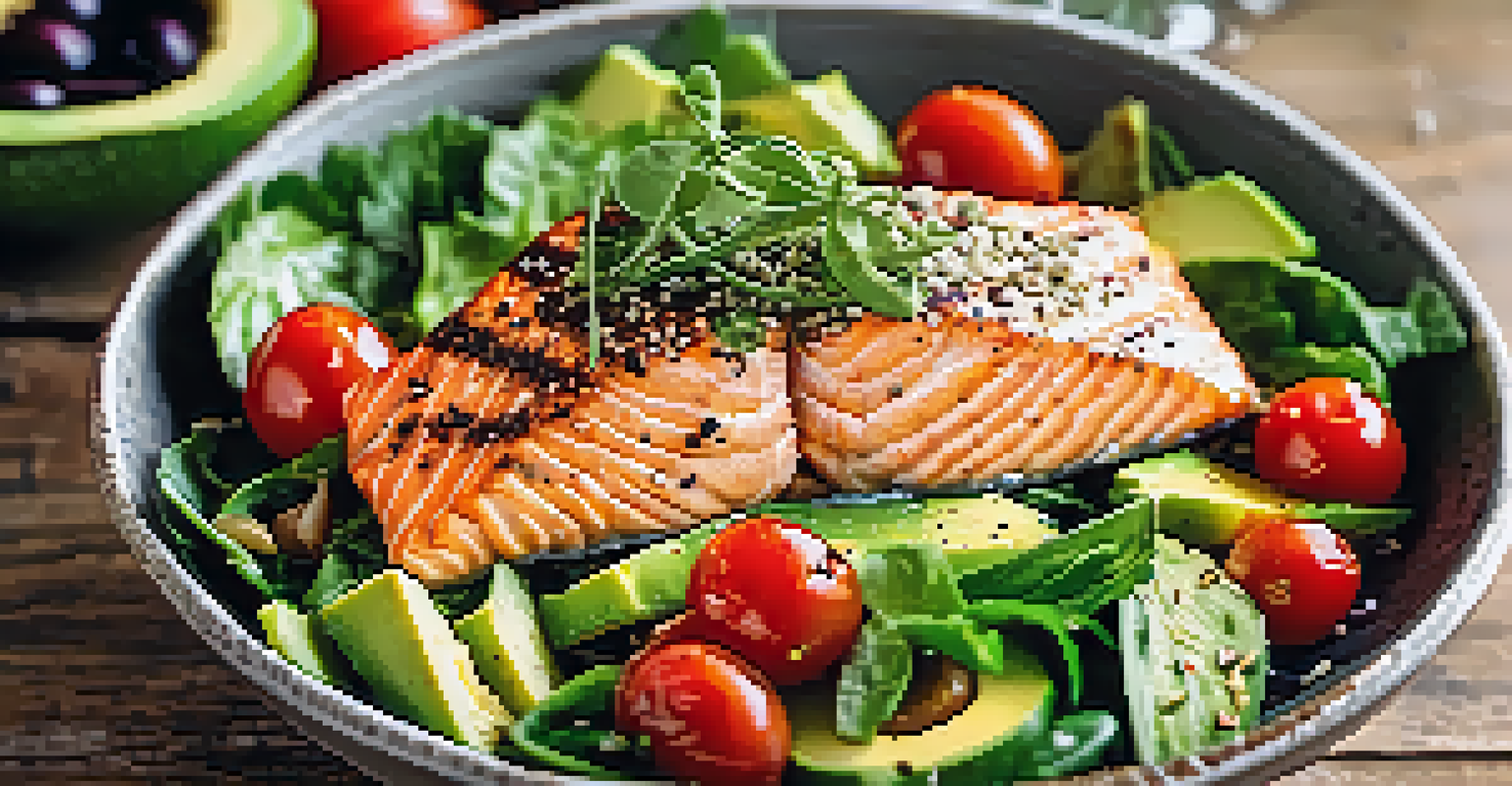Anti-Inflammatory Diets for Chronic Pain and Illness Relief

What is an Anti-Inflammatory Diet?
An anti-inflammatory diet focuses on eating foods that help reduce inflammation in the body. It emphasizes whole foods like fruits, vegetables, whole grains, and healthy fats while minimizing processed foods and sugars. The idea is that certain foods can trigger inflammation, contributing to chronic pain and illness.
Let food be thy medicine and medicine be thy food.
Think of this diet as a way to fuel your body with the nutrients it needs while avoiding those that provoke pain and discomfort. For example, instead of reaching for sugary snacks, you might choose a handful of nuts or a piece of fresh fruit. This shift in choices can have a profound impact on how you feel day-to-day.
It's important to note that an anti-inflammatory diet isn't a quick fix; rather, it's a lifestyle change that can lead to long-term health benefits. By consistently choosing anti-inflammatory foods, you may notice improvements in your overall wellness and a reduction in chronic pain symptoms.
The Science Behind Inflammation
Inflammation is a natural response of the body to injury or infection, but chronic inflammation can lead to various health issues, including pain. When the body is constantly in a state of inflammation, it can contribute to conditions like arthritis, heart disease, and other chronic illnesses. Understanding this connection is key to managing pain effectively.

For instance, when you eat foods high in sugar or saturated fats, your body may react by increasing inflammation. Conversely, foods rich in omega-3 fatty acids, such as salmon or walnuts, can help lower inflammation levels. This scientific insight provides a solid foundation for making dietary changes that can enhance your health.
Focus on Anti-Inflammatory Foods
An anti-inflammatory diet emphasizes whole foods like fruits, vegetables, and healthy fats to reduce chronic inflammation and improve overall wellness.
In essence, addressing inflammation through diet is about creating a balance. By incorporating anti-inflammatory foods into your meals, you help your body combat the harmful effects of chronic inflammation, potentially leading to pain relief and improved quality of life.
Key Foods to Include in Your Diet
Incorporating anti-inflammatory foods into your diet can be both delicious and nutritious. Some top choices include berries, leafy greens, fatty fish, nuts, and olive oil. These foods are not only packed with essential nutrients but also contain compounds that fight inflammation.
The greatest wealth is health.
For example, berries are rich in antioxidants, which help reduce oxidative stress in the body. A simple breakfast of oatmeal topped with fresh blueberries and a sprinkle of walnuts can be a great start to your day. Additionally, spices like turmeric and ginger are known for their anti-inflammatory properties and can be easily added to various dishes.
Making these food choices a regular part of your meals can lead to significant improvements in your health. It's about finding what you enjoy and integrating these foods into your everyday life, making healthy eating a sustainable habit rather than a chore.
Foods to Avoid for Reducing Inflammation
Just as there are foods that can help reduce inflammation, there are also those that can exacerbate it. Processed foods, sugary snacks, and trans fats are prime culprits that can lead to increased inflammation in the body. By minimizing these foods, you can help alleviate chronic pain symptoms.
For instance, cutting back on sodas and sweets can be a game-changer for your inflammation levels. Instead of reaching for a bag of chips, consider snacking on fresh vegetables or hummus. These small changes can make a big difference in how you feel over time.
Avoid Pro-Inflammatory Foods
Minimizing processed foods, sugars, and trans fats is crucial for reducing inflammation and managing chronic pain.
Ultimately, being mindful of what you eat is crucial in managing chronic pain. By steering clear of pro-inflammatory foods, you allow your body to focus on healing and maintaining a state of balance, contributing to your overall well-being.
How to Transition to an Anti-Inflammatory Diet
Transitioning to an anti-inflammatory diet doesn't have to be a daunting task. Start by making small, manageable changes to your meals. For example, you might replace one processed snack a day with a piece of fruit or a handful of nuts. Gradually, these small adjustments can lead to significant changes in your eating habits.
Another effective strategy is meal prepping. By planning your meals ahead of time, you can ensure that you have plenty of anti-inflammatory options on hand. Preparing dishes like quinoa salad with leafy greens and grilled salmon can provide delicious, healthful meals throughout the week without the stress of last-minute cooking.
Remember, the goal is to create a sustainable eating pattern that works for you. Be patient with yourself during this transition, and celebrate your progress along the way. Over time, you'll likely find that your body responds positively to these new dietary choices.
The Role of Hydration in Inflammation
Hydration plays a vital role in managing inflammation and overall health. Drinking enough water helps your body flush out toxins and supports optimal bodily functions. When you're well-hydrated, your joints also benefit, reducing discomfort associated with chronic pain.
A good rule of thumb is to aim for at least eight 8-ounce glasses of water a day, but individual needs may vary. Herbal teas and infused water with fruits or herbs can also contribute to your hydration goals while offering additional health benefits. For example, ginger tea not only hydrates but also has anti-inflammatory properties.
Seek Professional Guidance
Consulting with a healthcare professional can provide tailored advice and support for successfully adopting an anti-inflammatory diet.
By prioritizing hydration alongside your anti-inflammatory diet, you create a comprehensive approach to managing pain. This synergy between what you eat and how much you drink can lead to a more balanced, healthier lifestyle.
Consulting with Professionals for Personalized Guidance
While adopting an anti-inflammatory diet can be beneficial, consulting with a healthcare professional or nutritionist can provide personalized guidance tailored to your needs. They can help assess your current diet, identify areas for improvement, and suggest specific foods that align with your health goals. Personalized advice is particularly crucial if you have underlying health conditions or dietary restrictions.
Working with a professional can also help you set realistic goals and create a structured meal plan that fits your lifestyle. This support can be invaluable, especially if you're feeling overwhelmed by the idea of changing your eating habits. They can guide you through the process, ensuring you remain on track and motivated.

Ultimately, having expert guidance can enhance your success with an anti-inflammatory diet. With their support, you'll be better equipped to make lasting changes that can lead to improved health and reduced chronic pain.